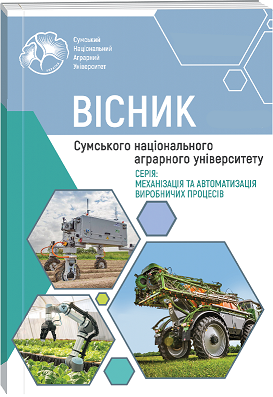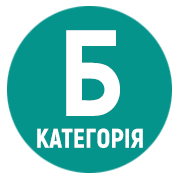THE ROLE OF MODERN TECHNOLOGIES IN ENSURING SUSTAINABLE DEVELOPMENT IN AGRICULTURE THROUGH OPTIMIZATION OF SOWING PROCESSES
Abstract
The article considered the features of the implementation of innovative technologies in the activities of agricultural enterprises, determined the role of these technologies in the process of optimizing sowing. General scientific methods were used to research this issue, namely, analysis of sources, synthesis of received information, comparison of different approaches and methods, and generalization. The article outlined the main types of modern technologies used in agriculture. Blockchain technologies, new production technologies, wireless communication technologies, robotics and big data were attributed to them. It was determined that the use of robotics in agriculture allows for more efficient performance of routine tasks and optimization of the sowing process. Examples of robotics and technologies based on artificial intelligence, which are used in Ukraine, are given. The effectiveness of the use of systems of automated control and management of the sowing process was analyzed. It was determined that the use of such systems for quality control of the technological process of sowing contributes to maximum optimization, ensuring the appropriate quality of sowing, shortening of deadlines and effective use of material and financial resources, as well as reducing the manual work of personnel. It is noted that an important aspect in the automation of sowing is also the use of autopilots on agricultural machinery. The system of precision agriculture is characterized as one of the most promising technological innovations in the agricultural sector. The agrarians of the country actively use precision agriculture due to its ability to promote uniform growth and ripening of plants, to increase yields. Attention is focused on some problematic issues of the introduction of modern technologies in Ukraine. The main ones are related to the low level of attracting investments in the latest technologies, the insufficient level of material and technical support of agricultural enterprises, the low level of awareness of farmers regarding the effectiveness of the latest technologies, and the uneven distribution of stable Internet connections. In the process of automation, digitization of agriculture and the formation of food value, it is necessary to take into account these problematic issues. The system of measures to activate the innovative activity of agricultural enterprises should include the search for ways to stimulate development, assistance and comprehensive support of the state. Thus, the integration of innovative technologies in agriculture is a key factor for ensuring sustainable development and high competitiveness of the agricultural sector in today's realities.
References
2. Khudaverdiieva, V. (2022). Priorytety innovatsiinoho rozvytku haluzi silskoho hospodarstva [Priorities of innovative development of the agricultural sector]. International Science Journal of Engineering & Agriculture, 1(3), 62–86. https://doi.org/10.46299/j.isjea.20220103.6 (in Ukrainian)
3. Kravchenko, M. V. (2020). Mekhanizmy vprovadzhennia innovatsiinykh tekhnolohii u vyrobnytstvo ahrarnoho sektoru [Mechanisms of introducing innovative technologies into the production of the agrarian sector]. Innovative Economy, (7–8), 158–164. https://doi.org/10.37332/2309-1533.2020.7-8.22 (in Ukrainian)
4. Kuchmiiova, T. S., Moroz, T. O., & Sheshunova, A. V. (2023). Vykorystannia shtuchnoho intelektu v silskomu hospodarstvi [Use of artificial intelligence in agriculture]. Modern Economics, (39), 69–74. https://doi.org/10.31521/modecon.V39(2023)-10 (in Ukrainian)
5. Malyarchuk, V., Lehkodukh, I., & Demydov, S. (2021). Doslidzhennya efektyvnosti vykorystannya systemy kontrolyu ta keruvannya vysivom SCSO-25 na sivaltsi S3-3 «Astra-3» [Research on the efficiency of using the SCSO-25 sowing control and management system on the C3-3 "Astra-3" seeder]. Technical and Technological Aspects of Development and Testing of New Machinery and Technologies for Agriculture of Ukraine, 28(42), 116–126. https://doi.org/10.31473/2305-5987-2021-1-28(42)-9 (in Ukrainian)
6. Manita, I. Yu., & Boltianska, N. I. (2020). Pytannia tsyfrovizatsii silskoho hospodarstva v Ukraini [The issue of digitalization of agriculture in Ukraine]. In Tekhnichne zabezpechennia innovatsiinykh tekhnolohii v ahropromyslovomu kompleksi (pp. 346–350). Melitopol: Dmytro Motornyi Tavria State Agrotechnological University. http://elar.tsatu.edu.ua/bitstream/123456789/12607/1/Маніта%20І.Ю..pdf (in Ukrainian)
7. Mondejar, M. E., Avtar, R., Diaz, H. L. B., Dubey, R. K., Esteban, J., Gómez-Morales, A., ... & Garcia-Segura, S. (2021). Digitalization to achieve sustainable development goals: Steps towards a Smart Green Planet. Science of The Total Environment, 794, Article 148539. https://doi.org/10.1016/j.scitotenv.2021.148539
8. Mushchenyk, I. (2023). Rol informatsiinykh tekhnolohii u silskomuhospodarstvi [The role of information technologies in agriculture]. In N. Orlova, O. Shevchuk, & N. Mentuh (Eds.), Proceedings of the XVI International Scientific and Practical Conference «Principles of science. Ideals, norms, values in science and style of scientific thinking» (рр. 17–19). Tallinn, Estonia: InterSci. https://intersci.eu/wp-content/uploads/2023/04/Principles-of-science.-Ideals-norms-values-in-scienceand-style-of-scientific-thinking.pdf#page=18 (in Ukrainian)
9. Pavelchuk, Yu. (2023). Vykorystannia informatsiinykh tekhnolohii u silskohospodarskomu vyrobnytstvi [Use of information technologies in agricultural production]. Science and Technology Today, (4(18), 335–347. https://doi.org/10.52058/2786-6025-2023-4(18)-335-347 (in Ukrainian)
10. Rudenko, M. V. (2019). Vplyv tsyfrovykh tekhnolohii na ahrarne vyrobnytstvo: metodychnyi aspekt [Impact of digital technologies on agricultural production: methodical aspect]. Scientific notes of Taurida National V.I. Vernadsky University Series: Economy and Management, 30(6), 30–37. https://doi.org/10.32838/2523-4803/69-6-28 (in Ukrainian)
11. Vlasenko, T., Larina, T., & Dziubanovska, N. (2022). Vplyv innovatsii na upravlinnia tekhnolohichnym rozvytkom haluzi roslynnytstva [The influence of innovations on the management of technological development of the field of crop production]. Bulletin of the Khmelnytskyi National University. Series: "Economic Sciences", 2(6), 370–375. https://doi.org/10.31891/2307-5740-2022-312-6(2)-62 (in Ukrainian)
12. Vyshnevetska, O. V. (2023). Rozvytok innovatsiinykh tekhnolohii v roslynnytstvi [Development of innovative technologies in crop production]. Scientific Perspectives, (10(40), 385–397. https://doi.org/10.52058/2708-7530-2023-10(40)-385-397 (in Ukrainian)

 ISSN
ISSN  ISSN
ISSN 



